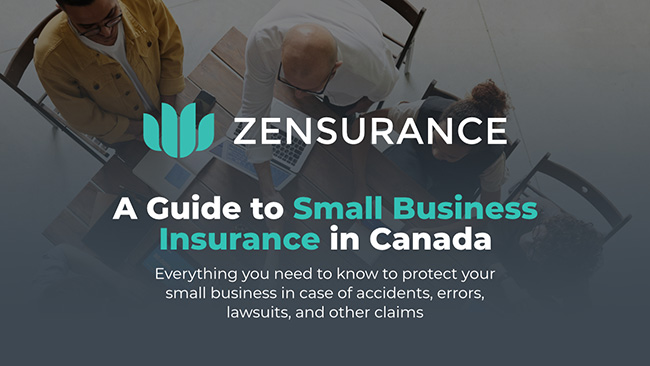Owning and running a small business can transform your life, and there are many upsides to doing so, from leaving a positive impact on the world and achieving financial independence to doing what you truly love.
And Canadian small businesses are a collective powerhouse of our national economy. Government statistics show 97.7% of all businesses in Canada are classified as small or micro-sized companies employing almost 68% of our private labour force and contributing 36.7% to our country’s gross domestic product (GDP).
However, growing and maintaining a successful venture requires grit, determination, and consistency. Moreover, the road to success can be bumpy, and unexpected challenges can crop up.
Business owners know they need a backup plan for if and when things go wrong. A comprehensive business insurance policy is vital to any organization’s success, continuity, and adequately dealing with the unexpected.
Firstly, let’s get a quick primer on what business insurance (also known as commercial insurance) is in Canada.

Download Our FREE Insurance Whitepaper
Learn everything you need to protect your small business.
Your email address will be used by Zensurance to provide latest news, offers and tips. You can unsubscribe at any time.

What Is Business Insurance in Canada?
Business insurance is a customized policy designed to protect business owners against common risks by ensuring the financial losses associated with unforeseen hazards such as a natural disaster, accident, or lawsuit don’t shutter your business permanently.
In essence, it provides financial security by transferring the potential risks faced by your company to an insurance provider in exchange for an annual premium. A commercial policy typically features various coverages tailored to your company’s specific needs and risks.
10 Types of Business Insurance Your Company Should Consider
There are many options for insuring your business, but it can be overwhelming to determine what type of coverage and how much you need.
Let’s make it less so. Here are 10 types of insurance coverages that your business may need to create a comprehensive policy:
1. General Liability Insurance
General liability insurance protects you from costs associated with third-party bodily injury or property damage claims. For example, if a customer or delivery person visiting your office or store trips, falls, and fractures a wrist, they could sue you for damages (and lawsuits – even those without merit – get expensive fast). General liability is designed to cover the injured person’s medical expenses and can provide you with financial support for your legal defence.
2. Commercial Property Insurance
Whether you run a home-based business or your small business operates out of a commercial space you own, lease, or rent, commercial property insurance is a must-have. It covers the property, contents, and your inventory or merchandise if it is damaged or destroyed by fire, a natural disaster, or water damage. It also covers your losses due to theft or vandalism.
3. Professional Liability Insurance
If you offer your customers advice or provide services, such as those offered by a general contractor, consultant, or accountant, you’ll need professional liability insurance. Also called errors and omissions (E&O) insurance, it covers you for dealing with allegations of professional negligence, failure to deliver a service as promised, or mistakes you make that cause financial harm to your customers.
4. Product Liability Insurance
If you’re an online seller, distributor of goods, or retailer, you should include product liability insurance in your policy.
This type of coverage is also necessary for any professional or business owner selling, manufacturing, or distributing products. It protects you against customer claims alleging third-party bodily injury or property damage caused by a product you made, distributed, or sold. For instance, if you sell body lotion, and one of your customers suffers a severe allergic reaction after using it, they could sue you for damages.
Some general liability policies may include product liability coverage. But if it doesn’t, you can add it to your policy.
5. Cyber Liability Insurance
Almost every small business or self-employed professional has a website, stores data in the cloud, and uses email or a point-of-sale (POS) system. And unfortunately, small businesses are big targets for cybercriminals.
Cyber liability insurance is designed to cover the damages caused by a cyber-attack or data breach. It can help you by paying for legal advice, crisis management services, restoring or repairing software affected by an attack, and credit monitoring for your customers if their confidential data is stolen or compromised. You can be held liable for a cyber event that causes your customers harm.
6. Business Interruption Insurance
If you’re forced to close your business temporarily for repairs following an insurable loss, like a fire, business interruption insurance helps ensure your company survives by providing funds to cover lost income and pay your monthly overhead bills (rent, utilities, employee payroll). You must have commercial property coverage to qualify for business interruption insurance.
7. Tools and Equipment Insurance
For contractors, plumbers, landscapers, handypersons, and other skilled trades, tools and equipment insurance can cover losses related to the transportable tools (power tools, hand tools, safety gear) and equipment (bulldozers, backhoes) you own or rent if lost, damaged, stolen, or vandalized.
8. Commercial Auto Insurance
Does your company own a vehicle, or do you use your vehicle for business purposes? If so, adding commercial auto insurance to your policy is wise since most private-passenger car insurance policies don’t cover the cost of an accident to a car or truck used for transporting people, packaged goods, materials, or tools and equipment.
If your company has five or more vehicles, getting a fleet vehicle insurance policy for them is cheaper.
9. Commercial Umbrella Insurance
Some business owners and independent professionals can get hit with a claim or lawsuit that exhausts their existing policy’s coverage limits. Should that happen, you’re on the hook to pay for the rest. You can add commercial umbrella insurance to your policy to avoid that unpleasant possibility. It provides extra protection against catastrophic or high-cost liability claims that exceed the limits of your primary coverage.
10. Legal Expense Insurance
Statistics Canada data shows 700,000 civil court cases went to trial in 2020, with about half of them brought against small business owners.
On that note, an inexpensive coverage worth including in your policy, legal expense insurance, helps pay for various legal expenses you incur if you need to hire and retain a lawyer.
If you’re being sued, need legal advice, need help dealing with a contract dispute or debt recovery, or wish to pursue legal action against another business or individual, this type of coverage costs significantly less than hiring a lawyer directly.
How Much Does a Business Insurance Policy Cost?
There is no set price or annual premium for a commercial insurance policy, and different insurance providers charge different amounts for coverage.
What a policy may cost you depends on various factors about your business or line of work. Things like where you’re located, the services and products you offer, how many employees you have (if applicable), the types of coverage you need, and your insurance claim history are among the details an insurer considers when determining the cost of a policy.
However, a basic general liability policy with up to $2 million of coverage costs approximately $450 per year.
How to Get a Low-Cost Business Insurance Policy Quickly
Zensurance can help you get the low-cost business insurance policy you need quickly and customize it to suit your needs and budget.
Fill out our online application for a free quote. Our knowledgeable brokers are risk management experts who will shop our partner network of over 50 insurance providers to get the policy you need, explain the details of it, answer your questions, and advise you on the coverage limits and deductibles you should consider.
Recent Posts
5 Reasons Why You Need a Builder’s Risk Insurance Policy
Also known as course of construction insurance, a builder’s risk policy is a form of property insurance that protects contractors from the beginning to the end of their projects.
Is Your Landscaping and Lawn Care Business Protected?
Landscaping and lawn care businesses are gearing up for a busy season managing the health of their customers’ properties. See our tips for ensuring this season is a safe and problem-free one.
Do You Need Landlord Insurance to Rent Out a Room?
When renting out rooms in a boarding house or apartment, having landlord insurance is critical for protecting your investment and financial well-being. Here’s what you need to know.








